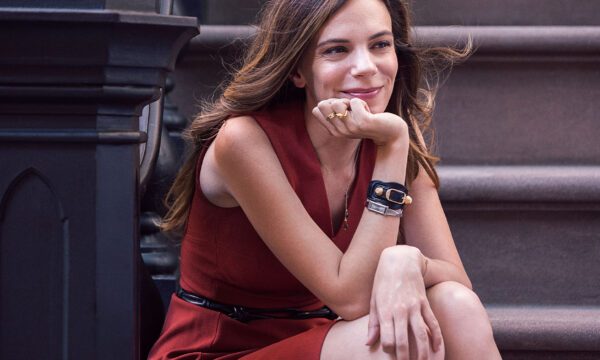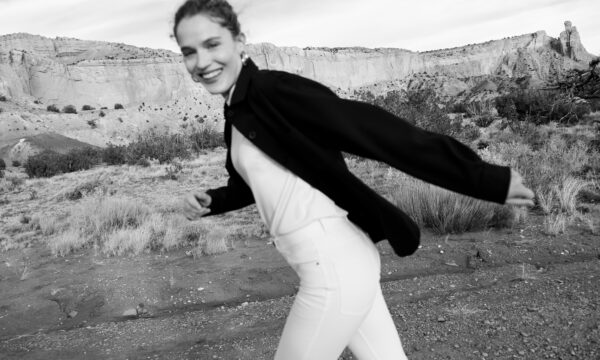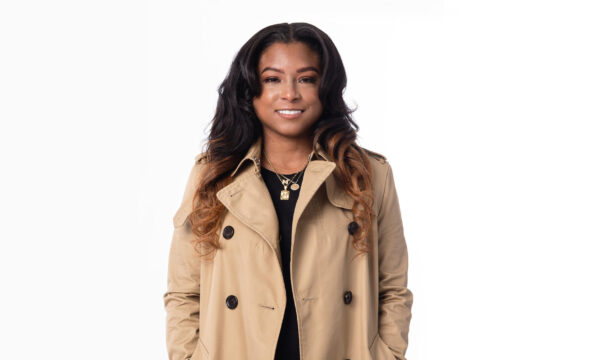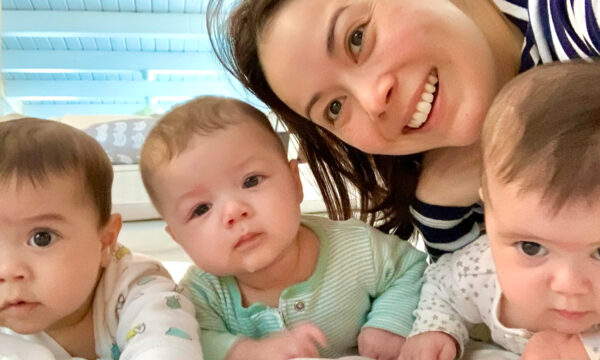
The Edith dress and Capri earrings.
Living Joyfully After Loss: A Conversation with Marisa Renee Lee and Rebecca Soffer
Embracing joy in the face of grief isn’t just possible—it’s necessary.
If you’ve been reading our newsletters over the past month, you’ve probably seen that for our summer collection, we’ve chosen to focus on joy, leaning into the brightness and levity of the season. The sun is out, travel is possible once again, and hope is on the horizon.
And we’re fully embracing those pockets of joy that we’ve experienced this summer—but at the same time, the past few years have marked a period of unprecedented loss. For many, grief has become a part of everyday life. So for the thousands and thousands of us who have lost family, friends, or coworkers, is living joyfully an option? According to authors Marisa Renee Lee and Rebecca Soffer, embracing joy in the face of grief is not only possible, but necessary.

Rebecca Soffer

Marisa Renee Lee
Marisa, whose new book, Grief Is Love: Living with Loss, was published in April, defines grief as “the repeated experience of learning to live in the midst of a significant loss.” “Living with loss is about making accommodations for the fact that your person isn’t here,” she explains. “You don’t forget about them. You don’t get over it. You instead have to rethink the rest of your life and figure out what it looks like to carry them with you into the present, even though they’re no longer physically here. I am all about owning it, being honest about when it’s hard, when it’s awkward, and when it’s funny. Our books together give people the tools for how to live with it.”
Rebecca is the co-founder of the online community Modern Loss, and her new book, The Modern Loss Handbook: An Interactive Guide to Moving Through Grief and Building Your Resilience, comes out on May 17th. “Modern Loss was started as a way to fill the white space in an area that had mostly been filled by religious conversations, very therapeutic ones, or ones that were full of platitudes,” she says. “I wanted to create a storytelling platform, because stories are what makes people feel less alone. The Modern Loss Handbook is like a field guide to grief. It’s everything that I’ve learned from my experience of living with the loss of my parents, but also from thousands of Modern Loss community members around the world.”
Earlier this month, I had the opportunity to sit down with these two thoughtful and inspiring women for a virtual discussion on the power of storytelling, how to create space for joy, and why we should ignore the famous “five stages of grief.” Here are some of the most important lessons they shared.
Want more M Dash?
Sign up for our weekly newsletter.
Thank you!
“Odds are, someone you know is grieving right now.”
Marisa
We all are still living with the grief of this pandemic. Life hasn’t fully returned to “normal.” And if you lost someone you loved these last two years, there is no return to normal—you have been forced to figure out what it looks like to live without someone who was essential to who you are as a person. And that is really, really hard. My hope—and the reason I wrote Grief Is Love as well as my recent piece for The Atlantic—is for people to move with more compassion and empathy.
If someone in your community, in your neighborhood, or at your kid’s school is grieving, they’re not going to wear a T-shirt that says, “I lost my husband to Covid-19.” I think it’s really important that we keep in mind the fact that, odds are, someone you know is grieving right now. I hope that with that piece and with my book, I’m both helping people who are grieving and making sure people are considering what others might be going through.
“When we’re open to sharing our stories with other people, we change a culture, and we normalize a topic that is still taboo.”
Rebecca
I had a piece in Time Magazine recently, and it was about the issue that I have with the phrase, “I can’t imagine.” It was tied to the ghastly milestone of one million Covid-related deaths that, to be honest, we probably hit a long time ago. The fact of the matter is that there’s an enormous amount of death in this country and in this world. And newsflash—people are still dying from other things, too. There are still miscarriages, there are still car accidents, there are still illness-related deaths.
I wrote about the phrase, “I can’t imagine,” because I feel like it’s this like platitude that people automatically hear themselves saying when they’re talking to somebody who is grieving, or when they’re reading a story about someone who died from Covid. And the point is that we should imagine; as Marisa said, we have to imagine.
I don’t have an issue if you say, “Oh my God, I can’t imagine,” and you’re open to hearing that person’s story. We’re talking more about your mindset—are you willing to listen to people’s stories of their loss, of their hardship, of their adversity? Are you willing to sit with them in a place that might feel uncomfortable to you and think about the challenges they might be facing?
When we’re open to sharing our stories with other people, we change a culture, and we normalize a topic that is still taboo. And maybe, we can get ourselves to a better place in this country where we’re enacting more policies that protect people who are bereaved. Storytelling is what impacts us. It’s what gets into our hearts and makes us understand what something can feel like and how we need to change it and make it better for someone.
“When we give ourselves permission to grieve and to acknowledge all that we’ve lost, we create space for joy to enter into the equation.”
Marisa
My mom first got sick when I was 13, so I had to figure out at a young age what it looks like to hold both grief and joy. That was a cornerstone of my childhood that, frankly, I took for granted—it was something that I didn’t realize I was learning. And then, when I was 25, she literally died laughing. She had stage four cancer, and I was telling her a joke. She collapsed and died a few hours later.
When I think about my mom and her life, as much as she suffered, I also think a lot about joy. She was the person who was on top of every birthday, every holiday—she was obsessed with Christmas. So I knew that I needed to have a chapter in Grief Is Love dedicated to joy. And I’m not talking about joy in a toxic positivity, “suck it up,” “you should be happy” kind of way. I think that’s bullshit, frankly. I am talking about being intentional about and creating space for your grief so that there is room for joy. When we give ourselves permission to grieve and to acknowledge all that we’ve lost, we create space for joy to enter into the equation. Sometimes it’s grief and joy. Sometimes it’s joy, independent of grief. Sometimes it’s grief, independent of joy. But being honest about whatever you’re feeling is a really important part of it.
“People say grief changes you, and it’s true—but you’re still you.”
Rebecca
My mom died in a car accident when I was 30 and very much in the build phase of my life. I was single, and I had my Jennifer Convertible from college in my apartment—I was like a 30-year-old teenager, because that’s what you are when you’re 30 and in Manhattan. And then suddenly, I became a grownup. I wasn’t mothered anymore, so I had to mother myself, and it was really hard. And yet, I still found myself laughing at her funeral—not because I was looking to laugh, but because there were some moments that were just so ludicrous that you just had to laugh.
I was working in comedy at the time, and I remember noting the feeling of laughter and how it was an unexpected reminder that I was still me. You really feel like a cyborg when you’re in those early stages of grief. People say grief changes you, and it’s true, but anything changes you. Motherhood changes you, a job changes you—but you’re still you. It was nice to be reminded that I could still have a light moment.
Marisa and I are both very adamant about people finding those corners of happiness. Maybe they’ll be here and there, but you really have to go after them with all that you have.

Left: The Modern Loss Handbook: An Interactive Guide to Moving Through Grief and Building Your Resilience by Rebecca Soffer
Right: Grief Is Love: Living with Loss by Marisa Renee Lee
“If you’re still sad, and it’s been a year, or two years, or 10 years, or more, you’re not doing it wrong. You are just human.”
Marisa
The five stages of grief were not written for people who have experienced a loss. They were originally written for people who were dying themselves, and somehow—in what I honestly think is one of the worst games of telephone—that message got lost, and we started applying those five stages to people who are grieving the loss of a loved one.
We think of grief as this linear progression, believing that once you go through the steps, you’re good to go. That is absolutely not how it works. And the sooner we can help people let go of a framework that is dated, inaccurate, and unhelpful, the sooner we can help people feel less alone and remove the shame and alienation around grief and loss. If you’re still sad, and it’s been a year, or two years, or 10 years, or more, you’re not doing it wrong. You are just human.
“When you put a new frame on something, it looks different—and that’s the point.”
Rebecca
Ritual allows us to literally reframe experience. When you put a new frame on something, it looks different—and that’s the point. I’ll give one example that’s close to home, because it’s about one of my best friends from college. Her father’s name was Dave Johns, and he died from cancer right after she graduated college. After some very difficult Dave Johns birthdays over the first few years, the whole family really dreaded that day.
At some point, she was like, “I can’t do this. I can’t have this painful day. I have to turn this into something, somehow.” And so she thought about what he really loved, and what came to mind were Bombay Sapphire cocktails and Big Macs. So, she created the Dave Johns Annual Memorial Big Mac Day on his birthday. She started inviting people over email, saying, “Listen, I really need you to go get something super indulgent. Send me a picture, send me a description. I want to know that you’re celebrating my dad, but also doing something that feels indulgent and good to you.”
Now we’re at the point where, every December, she posts on Facebook, and total strangers—friends of friends of friends—use it as an excuse to eat the worst crap that they can possibly put in their bodies. But they’re doing it in the name of this guy, and they’re witnessing the fact that he was here, and showing that to his daughter, who has turned something so individual into something so communal. And I just love that.
“If you know someone else who’s grieving, seek them out. There is a lot of company and support that can be found through others who have had similar experiences.”
Marisa
I was back at work exactly two weeks after we buried my mom. At the time, I was working on Wall Street, and it was also the height of the financial crisis. It was awful. When I would leave the subway to walk to my office building, I would start having a panic attack, and I could hold it together just long enough to get from the subway to the basement of my investment bank.
Every morning for months, I was a mess on the floor of the basement. And one of my coworkers, who was also a good friend, would come downstairs and bring me a Xanax, a cookie, and a soy latte. That was how I did it. I do not recommend that, and this is why I share that story. Knowing what I know now about grief, if I could have, I would’ve taken more time off. I didn’t have the financial freedom to do that at the time.
If you are heading back to work or already back at work after experiencing a significant loss, it’s really important to be intentional about having a plan and to give yourself some space and some breaks—even if it’s just going for a walk for 10 minutes a day, so that if you’re feeling anxious, depressed, sad, etc., you give yourself some room to experience those emotions without having to expose your feelings to everybody who you work with.
Now that we are in this horrendous place where so many people are grieving by default, odds are somebody else at work is having a similar experience, or at least can relate to the experience that you’re having. If you know someone else who’s grieving, seek them out. There is a lot of company and support that can be found through others who have had similar experiences.
When I returned to the office, I found a pile of fun, little treats, like my favorite candy, a mix CD, and some fun pens. They were from a girl I worked with, who I wasn’t particularly close to, but who had lost her brother to suicide when she was younger. She knew what it was like to live with loss and to be back in a place where there are expectations and responsibilities when you’re still not feeling like yourself. Give yourself some room, even if it’s only a little bit, to tend to your feelings at work, and if you have the opportunity, seek out support at work, too.
“We need to get rid of the guilt in grief. It serves no one.”
Marisa
There is so much grief that is riddled with guilt, and we just need to get rid of all of that. I am a big believer that when you lose someone you love, you simply deserve, as a human being, to do whatever you need to do to get through it. Whether it’s therapy, exercise, time off from work, or time spent alone—whatever it is, you are worthy of that.
I think that in order to be fully functioning human beings, we are supposed to experience joy and happiness and laughter. And there is no reason to feel guilty about any of it. Grief is hard enough without adding things like guilt or shame. We need to get rid of the guilt in grief. It serves no one.
Rebecca
Agreed. You’ve been through enough—why throw on the guilt? When it comes to grief, at least at Modern Loss, our M.O. is that if you’re not hurting yourself or anybody else, you do you. Who cares if you’re laughing? Who cares if your way of coping is just working on your car endlessly? Who cares if what makes you feel comfortable is watching a thousand hours of Scrubs reruns? There is no magic bullet for grief. Cut yourself a break and know that what might have worked for somebody else may not work for you. And that’s okay.










